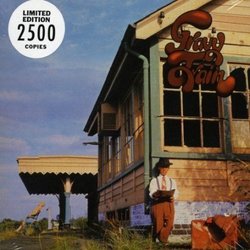Garage prog; worth a look
Elliot Knapp | Seattle, Washington United States | 10/19/2007
(4 out of 5 stars)
"In his review for this album, Allmusic.com reviewer Dave Thompson declares, "Jethro Tull and Comus had a baby, and they named it Gravy Train." This statement offers a couple valid reference points, but really doesn't effectively capture Gravy Train's sound at all. Insofar as they feature a heavy, bluesy, guitar sound and have a flautist, Gravy Train are similar to Jethro Tull. However, they lack the pastoral qualities and composition in the folk idiom that typify Jethro Tull. As far as the Comus reference, guitarist/singer Norman Barratt does sound quite a bit like Comus' Roger Wooton, with an occasionally tortured, rough wail, albeit with somewhat less of a wild creative range. Comus has flute too, and they're weird, but that's as close to Comus' crazy, fantastical, dark and unique heights as they get. I think the best summation of Gravy Train's debut sound is garage prog--they have a hard, rough sound, play around with songwriting form quite a bit, don't mind some strange sounds, but their instrumental prowess and compositional complexity falls far short of what other progressive rock acts like Gentle Giant and the more popular Yes were doing at the same time. Gravy Train is a reasonable representation of what the adventurous Vertigo label was putting out in the early-70's, and if garage prog sounds promising to you, you just might want to check them out.
When Gravy Train's debut is good, it's really good. The opener, "The New One," is one of the strongest tracks on the whole effort, with a jazzy flute opening that gives way to much harder sounds. A heavy guitar riff, backed by pounding drums and high-pitched backing vocals break the jazzy spell and rock pretty impressively. The song has a couple surprising changes and makes for a solid opener. The second song, "Dedication to Sid," (an incorrectly-spelled tribute to Syd Barrett), is also a pretty strong rocker with some iffy (artificially high-pitched) vocal effects. "Coast Road" is a driving blues number which reveals how committed Gravy Train were at breaking musical boundaries--Barratt's lead guitar sounds a lot more confident busting out some blues licks than it did on the exploratory first couple of numbers. Although "Coast Road" isn't too adventurous, it's pretty dang heavy, so Gravy Train chalks up more points for rocking hard. "Enterprise" is another great track, with varied parts, tempos, and some heavy, hard rock. Norman Barratt's vocals sound great, but I guess they're probably considered unusual and might not be to everyone's taste. The closing track, "Earl of Pocket Nook," is 16 minutes long, featuring some extended jamming, some inspired riffing, and some drawn out tension-building. Overall, it probably could have been about 4 minutes shorter and just as effective.
My two biggest criticisms of Gravy Train's debut are the flute/saxophone player and the lyrics. Throughout, the flute playing serves its purpose but not outstanding, sounding good playing parts but not great improvising, but it really doesn't merit comparison to the outstanding flute playing in Jethro Tull and Comus. The saxophone playing is honestly sub-par--it's obvious that sax is not J.D. Hughes' primary instrument, and his playing during the jam-oriented songs is boring (lots of the same note, over and over again) and sometimes a bit irritating to listen to. In other places, Gravy Train's hard-rocking outshines their instrumental shortcomings ("Think of Life"'s uptempo chorus, for example), but it's hard to overlook the sax playing. The lyrics are really a matter of personal taste, but Barratt's lyrics aren't really a selling point for Gravy Train--it doesn't sound like he really cares too much on some of them (honestly, what do the lyrics in "Dedication to Sid" really have to do with Syd Barrett?), and sometimes the ideas don't cohere very well.
On the whole, if you like hard rock, some jamming, and progressive song structure, Gravy Train is definitely worth a listen. A lot of people really get behind this album--it's got some fantastic parts and features some really energetic rock. I've enjoyed listening to it enough times to want to check out their second album, Ballad of a Peaceful Man, so if garage prog sounds appealing to you, you might be one of the converted to this rare treasure."


 Track Listings (6) - Disc #1
Track Listings (6) - Disc #1